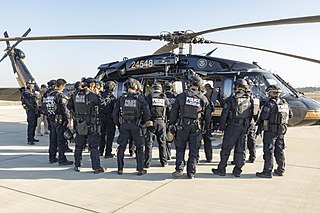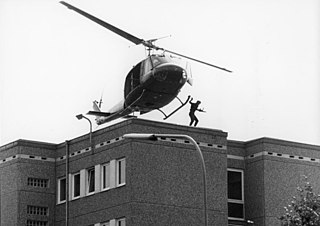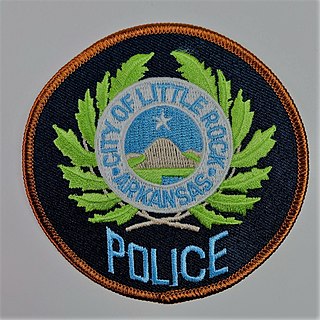
In the United States, a SWAT team is a police tactical unit that uses specialized or military equipment and tactics. Although they were first created in the 1960s to handle riot control or violent confrontations with criminals, the number and usage of SWAT teams increased in the 1980s and 1990s during the War on Drugs and later in the aftermath of the September 11 attacks. In the United States by 2005, SWAT teams were deployed 50,000 times every year, almost 80% of the time to serve search warrants, most often for narcotics. By 2015 that number had increased to nearly 80,000 times a year. SWAT teams are increasingly equipped with military-type hardware and trained to deploy against threats of terrorism, for crowd control, hostage taking, and in situations beyond the capabilities of ordinary law enforcement, sometimes deemed "high-risk".

The Federal Protective Service (FPS) is a Federal Law Enforcement agency of the United States Department of Homeland Security (DHS). It is also "the federal agency charged with protecting and delivering integrated law enforcement and security services to facilities owned or leased by the General Services Administration (GSA)"—over 9,000 buildings—and their occupants.

A police tactical unit (PTU) is a specialized police unit trained and equipped to handle situations that are beyond the capabilities of ordinary law enforcement units because of the level of violence involved. A police tactical unit's tasks may include: executing dangerous search warrants and arrest warrants for dangerous persons; arresting or neutralizing dangerous or mentally ill armed persons; and intervening in high risk situations such as shootouts, or hostage and terrorist incidents.

The Maryland State Police (MSP), officially the Maryland Department of State Police (MDSP), is the official state police force of the U.S. state of Maryland. The Maryland State Police is headquartered at 1201 Reisterstown Road in the Pikesville CDP in unincorporated Baltimore County.
In American law enforcement, the Emergency Service Unit, or ESU, is a multi-faceted element within a law enforcement agency’s Special Operations Command.

Law enforcement in the United States is one of three major components of the criminal justice system of the United States, along with courts and corrections. Although each component operates semi-independently, the three collectively form a chain leading from an investigation of suspected criminal activity to the administration of criminal punishment.
In the United States, a no-knock warrant is a warrant issued by a judge that allows law enforcement to enter a property without immediate prior notification of the residents, such as by knocking or ringing a doorbell. In most cases, law enforcement will identify themselves just before they forcefully enter the property. It is issued under the belief that any evidence they hope to find may be destroyed between the time that police identify themselves and the time they secure the area, or in the event where there is a large perceived threat to officer safety during the execution of the warrant.

The St. Louis County Police Department (SLCPD) is the primary and largest law enforcement agency serving St. Louis County in the U.S. state of Missouri. The current Chief of Police is Colonel Kenneth Gregory. According to the Charter of St. Louis County, the county police chief has all of the criminal law enforcement duties of the sheriff of St. Louis County, except for the operation of the St. Louis County Jail, which is handled by the St. Louis County Department of Justice Services (civilian), court bailiff and service of civil process. Court bailiff/civil process duties are provided by a court-appointed sheriff and his employees, none of whom have law enforcement powers.

Airport police units are a security police agency assigned to perform law enforcement functions at airports. They provide a wide range of law enforcement duties and responsibilities including patrol, investigation, traffic flow management, and control and response to airport emergencies. Airport police provide enhanced safety to airport employees, and to passengers. Officers can be found at security gates, throughout the terminal area, and around the airport’s perimeter.

Metropolitan Division, commonly referred to as Metro Division or just Metro, is a division of the Los Angeles Police Department (LAPD) under its Special Operations Group. Metropolitan Division is responsible for managing the LAPD's specialized crime suppression, K-9, mounted, and SWAT units, named "platoons".
The drug raid at the residence of Cheye Calvo, then-mayor of Berwyn Heights, Maryland, was a controversial action taken by the Prince George's County Sheriff's Office and Police Department on July 29, 2008. The raid was the culmination of an investigation that began in Arizona, where a package containing 32 pounds (15 kg) of marijuana was intercepted in a warehouse, addressed to the mayor's residence. Instead of confiscating the package, police allowed it to be delivered. Upon arrival, a SWAT team raided the house and held Calvo and his mother-in-law at gunpoint, and shot and killed his two dogs, one as it attempted to run away.

Jose Guerena was a U.S. Marine veteran who served in the Iraq War and who was killed in his Tucson, Arizona home on May 5, 2011 by the Pima County Sheriff's Department SWAT team. Deputies were executing a warrant to search Guerena's home while investigating a case involving marijuana being smuggled into the U.S. from Mexico.

The Lenco BearCat is a wheeled SWAT vehicle designed for military and law enforcement use. It is in use by several military forces and law enforcement agencies around the world.

The Little Rock Police Department (LRPD), is the primary law enforcement agency for Little Rock, Arkansas in the United States.
The Hallandale Beach Police Department is the law enforcement agency of Hallandale Beach, Florida. Its headquarters is located in a municipal building at 400 South Federal Highway, Hallandale Beach, FL 33009. In 2022, the chief of police is Michel Michel.
The Metropolitan Law Enforcement Council sometimes called "MetroLEC," is a regional mutual aid facilitator formed by 45 police agencies in the area near Boston, Massachusetts. It pools resources to provide SWAT, canine, hostage negotiation, computer crimes, motorcycle and other units throughout the area. Its fleet includes at least one armored car and a mobile command post. Press reports indicated that in 2016 it used its SWAT unit twenty-six times. MetroLEC, like other such agencies such as the North Eastern Massachusetts Law Enforcement Council, claims it is a private organization and exempt from open records laws.

The militarization of police is the use of military equipment and tactics by law enforcement officers. This includes the use of armored personnel carriers (APCs), assault rifles, submachine guns, flashbang grenades, sniper rifles, and SWAT teams. The militarization of law enforcement is also associated with intelligence agency–style information gathering aimed at the public and political activists and with a more aggressive style of law enforcement. Criminal justice professor Peter Kraska has defined militarization of police as "the process whereby civilian police increasingly draw from, and pattern themselves around, the tenets of militarism and the military model".

Rise of the Warrior Cop: The Militarization of America's Police Forces is a 2013 book written by investigative journalist Radley Balko and focuses on the subject of militarization of police in the United States.













